We all see ads about getting justice for victims of mesothelioma, but many people do not know what it is or why getting it is an injustice. Mesothelioma is a deadly cancer that invades the cells within the thin linings that surround certain internal organs, most often the lungs.
It is unjust because no one gets mesothelioma unless he or she has been exposed to asbestos, a mineral with tiny, microscopic fibers that can cause any of several heartbreaking illnesses when people inhale them. While the mineral occurs naturally in the ground, unless humans disturb it through mining or the disturbance of manufactured products containing asbestos, the fibers are normally not in the air.
Asbestos exposure has often happened in industrial, manufacturing, construction, demolition, ship maintenance, ship decommissioning, mechanical and other work settings.
Prognosis statistics
Unfortunately, the symptoms of mesothelioma often take decades to manifest and by that time, it is usually in an advanced stage with a poor prognosis. Every case is unique, but the American Cancer Society reports that the relative five-year survival rate is between five and ten percent. The younger the person is at diagnosis and the more operable the tumors, the longer he or she is likely to survive.
The ACS shares a study of the median survival time sorted by stage of cancer:
- Stage I: 21 months
- Stage II: 19 months
- Stage III: 16 months
- Stage IV: 12 months
Since diagnosis as early as stage I is rare, the average life expectancy from diagnosis to death is 18 months.
Mesothelioma’s rarity frustrates research opportunities. Another problem is that mesothelioma is often treatment-resistant. Standard treatment is surgery, chemotherapy, radiation, or a combination of these.
Hope for the future
Mesothelioma patients often participate in experimental clinical trials for potential relief from a disease without many options. New kinds of promising treatment are being studied:
- Biological therapy using natural substances produced in the body
- Anti-angiogenesis using drug combinations that block enzymes used by mesothelioma cells
- Photodynamic therapy using a drug that chemically reacts to light to kill mesothelioma cells
- Gene therapy that modifies genes to fight cancer cells
- Improved diagnostic methods to allow earlier detection
- Intensity-modulated radiation therapy or IMRT, a sophisticated radiation technology
- And others














